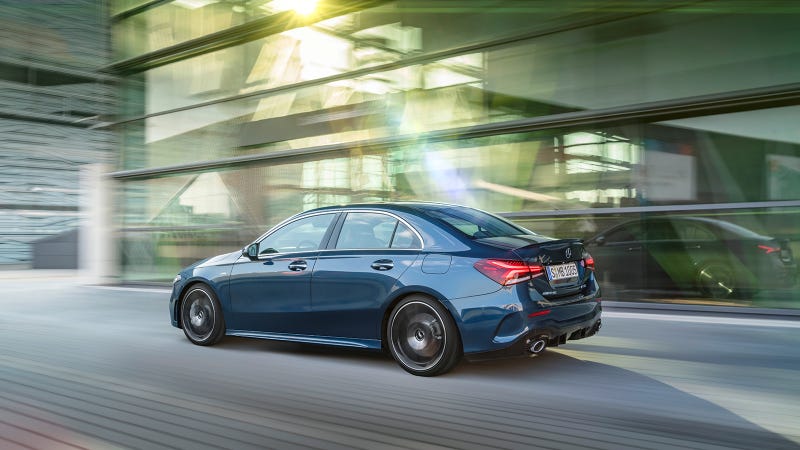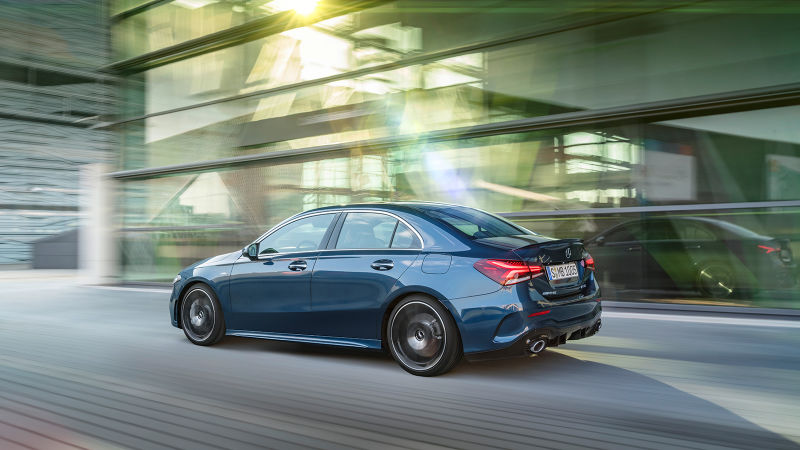
People in charge of automotive safety in the European Union have tentatively agreed on a litany of new car technology, including black box-style data recorders, that will be required standard equipment by 2022. Buckle up, it’s a pretty long list.
Before anybody gets too excited about anything here, the proposed agreement we’re talking about is “provisional” and the BBC reports that “it could be several months before the European Parliament and Council formally approve the measures” and “The European Parliament will not be able to consider the provisional rules until after its elections take place in May.”
Advertisement
That said, assuming the rules do get finalized, some of the proposals seem pretty significant.
Here’s a list of every car safety feature that the European Commission has slated to be required on all new cars sold in the EU starting in 2022:
- Advanced emergency braking (cars, vans)
- Alcohol interlock installation facilitation (cars, vans, trucks, buses)
- Drowsiness and attention detection (cars, vans, trucks, buses)
- Distraction recognition/prevention (cars, vans, trucks, buses)
- Event (accident) data recorder (cars, vans, trucks, buses)
- Emergency stop signal (cars, vans, trucks, buses)
- Full-width frontal occupant protection crash test-improved seatbelts (cars and vans)
- Head impact zone enlargement for pedestrians and cyclists–safety glass in case of crash (cars and vans)
- Intelligent speed assistance (cars, vans, trucks, buses)
- Lane keeping assist (cars, vans)
- Pole side impact occupant protection (cars, vans)
- Reversing camera or detection system (cars, vans, trucks, buses)
- Tyre pressure monitoring system (vans, trucks, buses
- Vulnerable road user detection and warning on front and side of vehicle (trucks and buses)
- Vulnerable road user improved direct vision from driver’s position (trucks and buses)
Advertisement
Emphasis mine, since the stuff that stands out are the “alcohol interlock,” event data recorder” and “intelligent speed assistance” and we’ll look more closely at those shortly. Just so we’re all on the same page first, here’s the exact language from the European Commission:
“The EU institutions have reached a provisional political agreement on the revised General Safety Regulation. As of 2022 new safety technologies will become mandatory in European vehicles to protect passengers, pedestrians and cyclists.”
I take that to mean these rules have already been debated and are pretty much green-lit, but of course “provisional” means they’re not locked in.
Advertisement
The Commission has apparently been working on this since May, 2018 and it’s all part of a grand scheme to minimize casualties of transportation, both in terms of human life and the condition of the environment. And it does seem that Britain will also adopt the rules, despite the fact that the country may not be a part of the European Union by the time they’re implemented.
Now let’s come back to the Big Brother and breathalyzer stuff so we can all dial in our enthusiasm or outrage appropriately. The European Commission has a lot of wordy press releases on its site, but I failed to find satisfactory definitions of the terms in its list. I’ve reached out for clarification of course, but we can still examine the wording ourselves and reference an explainer the BBC put together.
Alcohol interlock installation facilitation (cars, vans, trucks, buses)
An alcohol interlock is a breathalyzer between a car’s start button and its ignition system. In other words, you’d have to blow into a little thing in your car, and if the booze on your breath rated over the legal limit to drive, it wouldn’t let you start the engine. In the U.S., a judge might require you to get something like that if you got a DUI.
Advertisement
But the EU’s list of rules says “alcohol interlock installation facilitation,” not simply “alcohol interlock,” which would suggest that the legislation would just require an easy provision for the installation of such a device in a modern vehicle, as opposed to making everybody pass a breath test before driving anywhere.
Event (accident) data recorder (cars, vans, trucks, buses)
You’ve probably heard of an airplane’s “black box”–a device that records information like speed and system status during a crash to help investigators determine what went wrong.
Advertisement
Europe’s idea for cars sounds similar–such a recorder would take a snapshot of speed, position, braking, and such at the time of a crash, but not necessarily track every moment of every car all the time.
Intelligent speed assistance (cars, vans, trucks, buses)
What the European Commission calls “Intelligent Speed Assistance” and a lot of news outlets seem to be calling “speed limiting” has been most plainly defined by the BBC, as far as I can tell.
Advertisement
Basically ISA would be a system designed to prevent vehicles from breaking the speed limit, and it would do so by knowing the car’s position via GPS and knowing what the limit was by recognition cameras.
It is noted that “system can be overridden temporarily,” like to pass a bus or something, and most importantly, that the whole system could be turned off by a switch. If that’s true, optional systems like this are already baked into the interface of some luxury cars.
I’m curious to see if these provisionally agreed-upon regulations are met with a deluge of people pissed about trading freedom for safety, or the potential consequence of higher-priced cars, as I’d imagine they would be in America. But we’ll have at least a few months to find out what really comes of this.













